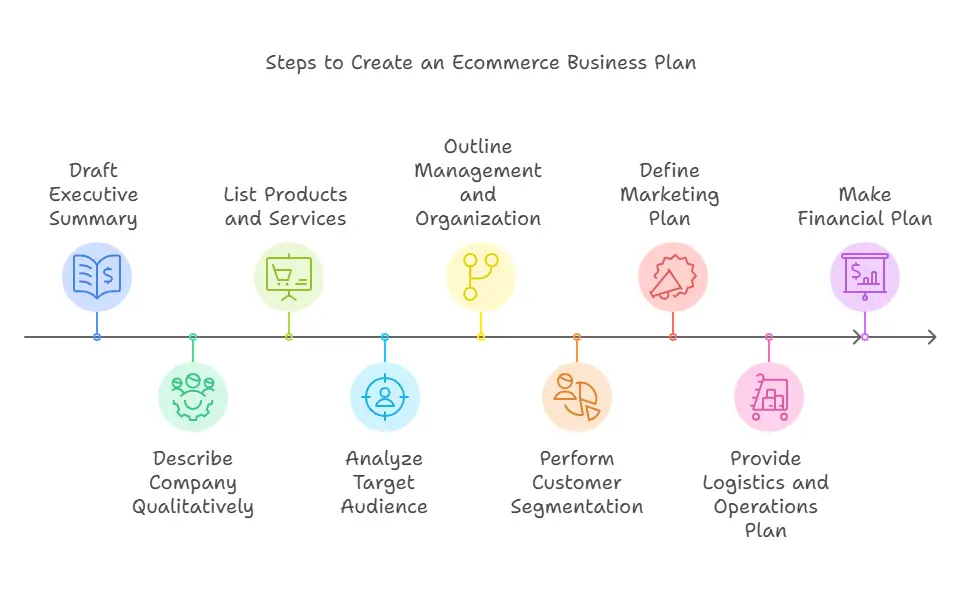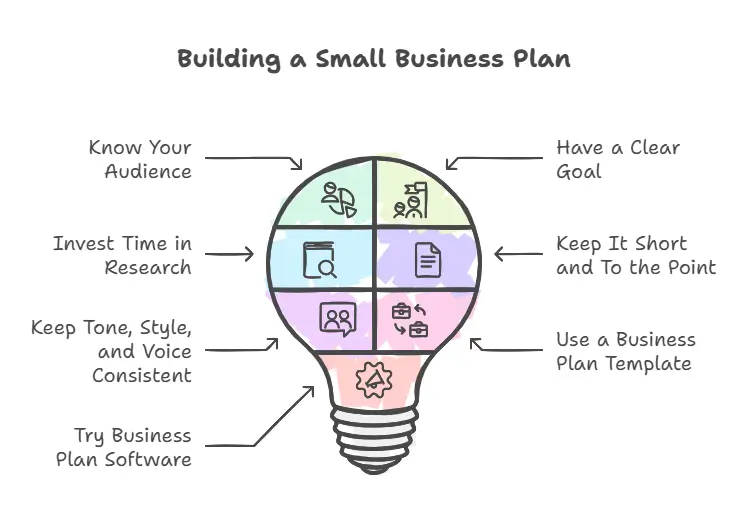Embark on creating your ecommerce business plan, akin to crafting a map for your entrepreneurial journey. Use the provided template as your guide through the maze of market analysis and strategic planning.
Learn how each part, from financial forecasts to competitor analysis, adds to your online success blueprint. Understand the art of making a roadmap that doesn’t only point out your profit route, but also sets your brand for lasting success in the digital realm.
How to create a defensible eCommerce business plan
For a sturdy eCommerce business plan, start by studying the market. Understand the industry, competitors, and customer likes. Set your business apart with a unique selling point.
Plan your finances – predict revenues, identify funding needs, and estimate costs. Sketch out a clear marketing plan. Focus on getting and keeping customers, and boosting brand awareness.
Make a flexible operational plan for logistics, customer service, and fulfillment. By including these in your plan, you lay a robust foundation for your eCommerce venture. This ensures strategic growth and staying power in the competitive online market.
How To Write an Ecommerce Business Plan in 9 Steps

1. Draft an executive summary
Starting an eCommerce business plan requires a solid executive summary. It serves as your business roadmap, offering a brief and clear overview of your business, including key elements like your unique selling point, target market, and competitive edge.
This section is crucial as it summarizes your business and can attract investors and stakeholders by showcasing your business’s potential.
A strong executive summary is essential for outlining the core aspects of your eCommerce business and setting the stage for further detailed planning and development.
It provides a snapshot of your business’s strengths and competitive advantages, guiding the reader towards a deeper understanding of your business concept and potential for success.
2. Describe your company (Qualitative)
Let’s take a closer look at conveying the qualitative aspects of your eCommerce business.
Consider these key points:
- Business Model: Give a clear picture of how your business plans to generate profits and maintain itself.
- Business Structure: Outline your company’s organization, including duties and roles.
- Legal Business Structure: Detail the legal framework your business uses.
- Business Overview: Share a brief synopsis of your company’s mission, values, and aims.
- Online Business Concept: Illustrate the distinctive idea that fuels your online business and distinguishes it from rivals.
3. List your products and services
What products or services will your online store offer? How do these fit with your business plan’s unique selling points?
Setting up your online store requires a clear outline of your product or service. Explain the variety of products you aim to sell and how they meet your target audience’s needs.
Your offerings could be unique items, tailored services, or a mix of both. Ensure your offerings align with your business plan’s vision.
Your products and services are the core of your online store. They play a large role in drawing and keeping customers. Keep your focus on delivering value and effectively meeting customer needs.
4. Analyze your target audience
To understand your business, dig deep into your target audience’s minds and actions. This will help you build a bond that fits their needs and likes. To effectively study your target audience, try these steps:
- Do thorough market research. Find out about their demographics, likes, and shopping habits.
- Use surveys, focus groups, and social media analytics. This will help you collect useful insights.
- Split your audience into segments based on shared traits. This will help with targeted marketing tactics.
- Make buyer personas to put a face to your audience and shape your messaging.
- Always keep an eye on and adjust your approach. This will help you keep up with changing consumer trends.
5. Outline the management and organization
For a well-crafted ecommerce business plan, first sketch out the management and organization. This includes the roles you aim to fill and their fit into the overall business plan.
Pinpointing key positions in your firm ensures smooth operations and clear task division. The table below could help organize the roles you aim to fill:
| Role | Responsibilities |
|---|---|
| CEO | Planning strategy and leading business |
| Marketing Manager | Creating and executing marketing strategies |
| Operations Manager | Overseeing daily operations and logistics |
Defining these roles clearly is crucial for an ecommerce business to align with the broader business plan.
6. Perform customer segmentation
To create a strong ecommerce business plan, first break down your customers. Group them based on what they need and like. This is a key part of your marketing strategy. It helps you reach the right people. Customer segmentation is key to make your business approach fit different customer groups.
- Break down customers into groups. You can do this based on age, behavior, or interests.
- Change your marketing messages and product offerings for each group.
- Look at data to see how each customer group buys things.
- Make promotions and campaigns that will attract certain groups.
- Always check and change your customer segmentation strategy to fit market trends.
7. Define a marketing plan
Craft your eCommerce business plan with a defined marketing plan. It outlines key marketing strategies to promote your products effectively and reach your target audience.
Your plan should include specific tactics to attract customers. These may be social media campaigns, influencer partnerships, or search engine optimization.
The success of your online business hinges on this plan. It details your marketing strategies, creating a roadmap for engagement with potential customers and sales drive.
A well-thought-out marketing plan is important for standing out in a competitive eCommerce field and building a strong online presence.
8. Provide a logistics and operations plan
In shaping your ecommerce business plan, don’t forget a comprehensive logistics and operations plan. It details how orders will be efficiently fulfilled. This part is crucial to your ecommerce business running smoothly. Remember these five key points when crafting your logistics and operations plan:
- Make your warehouse layout better for swift order fulfillment
- Create strong ties with trustworthy shipping carriers
- Use inventory management systems for correct stock levels
- Make a returns process that’s easy for customers
- Always check and improve your logistics and operations methods for better efficiency
Following these steps ensures your business operates without hiccups. It also promises a flawless experience for your customers.
9. Make a financial plan
Crafting a strong financial plan is key for your ecommerce business. The plan shows how your business will make money, handle costs, and use resources effectively. It covers topics like startup costs, sales predictions, profit boundaries, and cash flow estimates.
This plan is crucial for getting funding, making savvy decisions, and monitoring your business’s financial health. By grasping the financial parts of your e-commerce business plan, you can identify the funds needed to carry out your plan. Use financial tools and forecasts to build a solid base for your business’s financial triumph.
Adding a thorough financial plan to your overall business plan is central to guaranteeing your e-commerce business’s long-term survival and expansion.
7 tips for creating a small business plan

Crafting a small business plan demands a keen understanding of your audience. Tailor your strategy to them for efficacy.
Always keep a clear objective in the crosshairs, directing your choices and deeds.
Dedicate time to research. It affords crucial knowledge, molding a blueprint for your online shop.
1. Know your audience
Knowing your audience is key in starting an eCommerce business. This helps you shape your products and services to suit their needs. To truly know your audience, take these steps:
- Do deep market research to find your target demographic.
- Study consumer behavior to know their buying habits.
- Use surveys or focus groups to get insights.
- Watch social media interactions to find out customer likes.
- Break down your audience based on traits for custom marketing plans.
2. Have a clear goal
To succeed in your small business plan, set clear, measurable goals. They should guide decisions and track progress effectively.
Have distinct business goals that match your target market and unique selling points. Include detailed financial forecasts for realistic growth planning.
Carry out in-depth market research to grasp industry trends and opportunities for setting your business apart. Craft a focused marketing strategy to enhance brand recognition and drive sales.
Set detailed targets linked to your target market, financial forecasts, market research, and marketing plan. This creates a path to success in your e-commerce business plan.
Keep your eyes on these goals to guide your business towards long-term success.
3. Invest time in research
Have you thought about how spending time on deep research can help your small business plan? Doing market research is vital for a good online business strategy. Here are five reasons why time spent on research can aid your small business plan:
- Knowing the market: Research helps you understand industry trends, rivals, and your audience.
- Smart decision-making: Studying data assists in making wise decisions for your business plan.
- Spotting opportunities and hurdles: Research helps in finding growth areas and challenges.
- Adjusting products/services: Research allows you to understand and meet customer needs.
- Creating strong marketing strategies: Insights from data help in setting up your online business for success in the market.
4. Keep it short and to the point
For a successful small business plan, be brief. Highlight only the essential details. Short business plans are easy to handle and useful for quick decisions. Keeping it short puts emphasis on key points without overwhelming readers. Include only what’s necessary, focusing on clarity and brevity to convey your business strategy.
Concise plans are ideal for presenting to potential investors, they allow for quick understanding. Writing a concise, to the point business plan makes it easy to digest and a handy reference for your business.
5. Keep the tone, style, and voice consistent
Maintaining uniformity in tone, style, and voice is key when crafting a small business strategy. This ensures a unified and polished representation that resonates with your audience and stakeholders.
To make sure your e-commerce business plan hits the mark and effectively conveys your ideas, heed these pointers:
- Stick to a formal language throughout the manuscript.
- Uphold a professional and business-oriented tone.
- Keep the narrative style straightforward and succinct.
- Steer clear of blending informal and formal language.
- Revisit and rectify the strategy for uniformity in tone, style, and voice.
You should integrate the AI paraphraser into the writing workflow to seamlessly refine and adjust the text tone into styles.
6. Use a business plan template
Use a business plan model for your small business. Go for one designed for e-commerce. Templates give a good system to arrange your ideas. They help cover all key parts of your business strategy. Here’s a simple table to help pick the right model for your e-commerce business plan:
| Characteristic | Business Plan Model |
|---|---|
| Can Change Sections | ✔ |
| Financial Forecasts | ✔ |
| Market Study | ✔ |
| Rival Research | ✔ |
7. Try business plan software
Think about using business plan software for your e-commerce venture. This software makes the process easier and professional. It offers templates you can change to fit your business needs.
It guides you through each step, making sure you cover everything for your e-commerce plan. It lets you enter your data and ideas quickly. This helps create detailed money forecasts, market studies, and operation plans.
Conclusion
In conclusion, creating a robust ecommerce business plan is akin to constructing a strong ship for sailing the expansive oceans of online trade. Set precise objectives, comprehend your market, and devise unique tactics to guide your business to success.
A well-planned strategy is your beacon in the constantly shifting digital environment, directing you towards expansion and profit. Thus, embark with assurance, equipped with a strategy that will enable you to withstand any tempest.
FAQs
How do I conduct a market analysis for my eCommerce business?
Conducting a market analysis involves:
Identifying Your Target Audience: Determine the demographics, preferences, and behaviors of your potential customers.
Analyzing Competitors: Study your competitors’ strengths and weaknesses to identify opportunities and threats.
Assessing Market Trends: Keep abreast of industry developments to understand the current and future market landscape.
How should I approach financial planning for my eCommerce business?
Financial planning should encompass:
Startup Costs: Calculate expenses such as website development, inventory, and marketing.
Revenue Projections: Estimate sales based on market research and your business model.
Expense Forecasting: Anticipate ongoing costs like hosting fees, shipping, and employee salaries.
Profitability Analysis: Determine your break-even point and expected profit margins.


